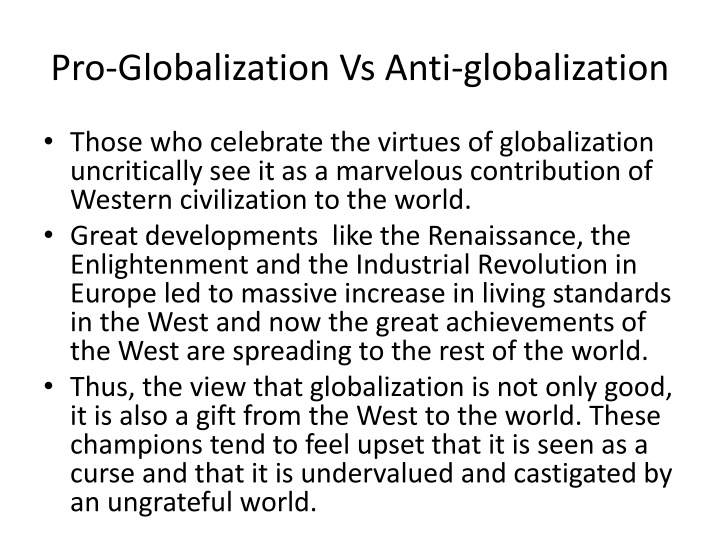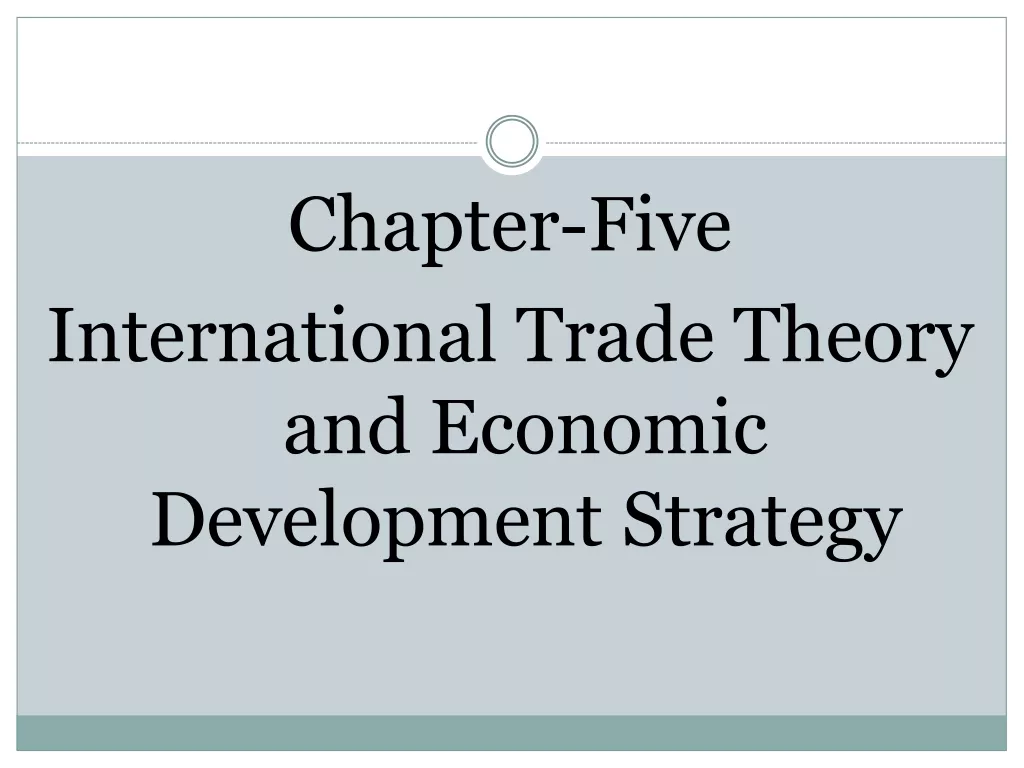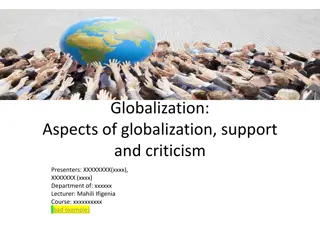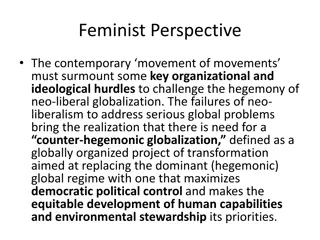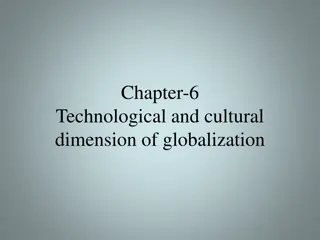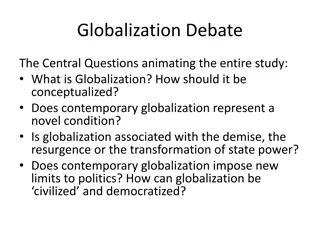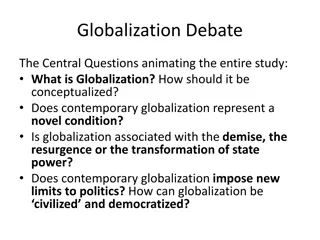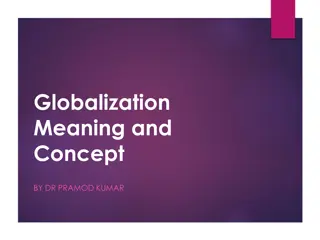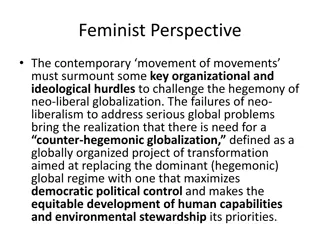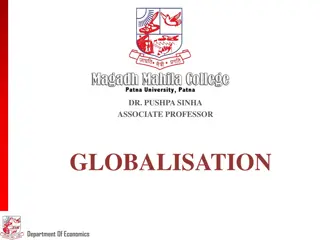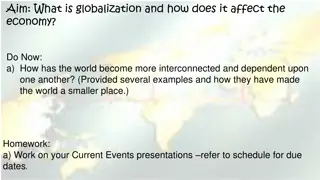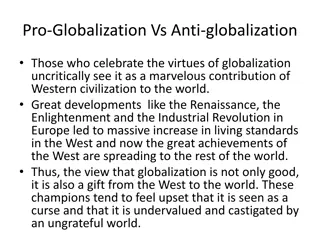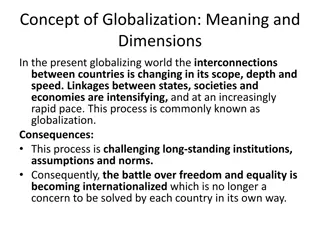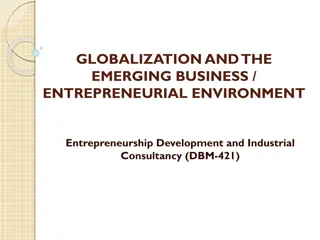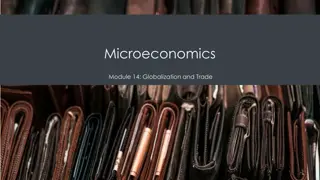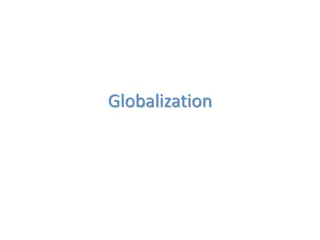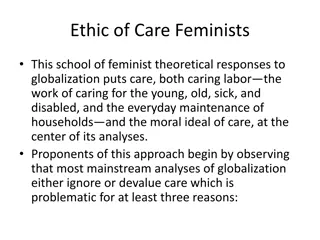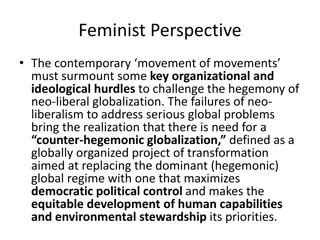Globalization Throughout History: East to West Perspective
Globalization has shaped the world for centuries through trade, culture, and knowledge exchange. While some view it as a Western gift, others see it as a continuation of imperialism. Yet, globalization is not solely Western, evidenced by historical contributions from the East to the West. The flow of technology, mathematics, and science has been bidirectional, challenging the notion of Western dominance in globalization.
Download Presentation

Please find below an Image/Link to download the presentation.
The content on the website is provided AS IS for your information and personal use only. It may not be sold, licensed, or shared on other websites without obtaining consent from the author.If you encounter any issues during the download, it is possible that the publisher has removed the file from their server.
You are allowed to download the files provided on this website for personal or commercial use, subject to the condition that they are used lawfully. All files are the property of their respective owners.
The content on the website is provided AS IS for your information and personal use only. It may not be sold, licensed, or shared on other websites without obtaining consent from the author.
E N D
Presentation Transcript
Pro-Globalization Vs Anti-globalization Those who celebrate the virtues of globalization uncritically see it as a marvelous contribution of Western civilization to the world. Great developments like the Renaissance, the Enlightenment and the Industrial Revolution in Europe led to massive increase in living standards in the West and now the great achievements of the West are spreading to the rest of the world. Thus, the view that globalization is not only good, it is also a gift from the West to the world. These champions tend to feel upset that it is seen as a curse and that it is undervalued and castigated by an ungrateful world.
Pro-Globalization Vs Anti-globalization (contd.) From the opposite perspective, Western dominance is seen as a continuation of Western imperialism. Contemporary capitalism, driven and led by greedy and grabby Western countries in Europe and North America, has established rules of trade and business relations that do not serve the interests of the poorer people in the world. The celebration of various non-Western identities- defined by religion, region or culture- can add fuel to the fire of confrontation with the West.
Globalization: Neither New Nor Necessarily Western and not a Curse. Over thousands of years, globalization has contributed to the progress of the world through travel, trade, migration, spread of cultural influences, and dissemination of knowledge and understanding. These global interrelations have often been very productive in the advancement of different countries. They have not necessarily taken the form of increased Western influence. Indeed, the active agents of globalization have often been located far from the West.
Globalization from the East to the West Around 1000 A.D., global reach of science, technology, and mathematics was changing the nature of the old world, but the dissemination then was, to a great extent, in the opposite direction of what we see today. The high technology in the world of 1000 A.D. included paper, the printing press, gunpowder, the iron-chain suspension bridge, the kite, the magnetic compass, the rotary fan, etc. These items were used extensively in China and were spread across the world, including Europe, through globalization. A similar trend is seen in the Eastern influence on Western mathematics. The decimal system emerged and became well developed in India between the second and sixth centuries. It was used by Arab mathematicians soon thereafter and these mathematical innovations reached Europe mainly in the last quarter of the tenth century playing an important part in the scientific revolution that helped to transform Europe.
Global Civilization: A World Heritage The agents of globalization are neither European nor exclusively Western, nor are they necessarily linked to Western dominance. Indeed, Europe would have been a lot poorer- economically, culturally, and scientifically- had it resisted the globalization of mathematics, science and technology at that time. The same principle applies today, though in the reverse direction (from West to East). To reject the globalization of science and technology because it represents Western influence and technology would amount to overlooking global contributions-drawn from many different parts of the world- that lie solidly behind so-called Western science and technology. It would also be quite a daft practical decision, given the extent to which the whole world can benefit from the process which is a global heritage.
Resisting Globalization of Ideas and Practices: A Misdiagnosis Opposing globalization on the plea that it represents Westernization or Western imperialism of ideas and beliefs has played quite a regressive part in the colonial and postcolonial world. This assumption incites parochial tendencies and undermines the possibility of objectivity in science and knowledge which is counter-productive in itself. Of course, there are issues related to globalization that do connect with imperialism and a postcolonial understanding of the world has its merits. But it would be a great mistake to see globalization primarily as a feature of imperialism. It is much bigger- much greater- than that.
Just Distribution of Benefits: The Main Issue The issue of the distribution of economic gains from globalization must be addressed as an extremely relevant issue. In overcoming pervasive poverty and inequality extensive economic interrelations and modern technology have been and remain influential- e.g. Europe, America, Japan, and East Asia have important lessons for all other regions. There cannot be much progress in understanding the nature of globalization today without first acknowledging the positive fruits of global economic contacts. Thus, the main issue is how to make good use of the remarkable benefits of economic intercourse and technological progress in a way that pays adequate attention to the interests of the deprived and the underdog. That is the constructive question that emerges from the so-called antiglobalization movements.
Justice and Inequality: the Principal Challenge (contd.) The troubling inequalities include disparities in affluence and also gross asymmetries in political, social, and economic opportunities and power. A crucial question concerns the sharing of the potential gains from globalization- between rich and poor countries and among different groups within a country. It is not sufficient to understand that the poor of the world need globalization as much as the rich do; it is also important to make sure that they actually get what they need which may require extensive institutional reforms.
Justice and Inequality(contd.) There is also a need for more clarity in formulating the distributional questions. It is often argued that the rich are getting richer and the poor poorer. But even though there are cases in which this has happened, by no means this is uniformly so. Much depends on the region or the group chosen and what indicators of economic prosperity are used. On the contrary, the apologists of globalization point to their belief that the poor who participate in trade and exchange are mostly getting richer. So the argument they too benefit is turning the debate to an empirical dispute. The central relevance of this question is not accepted by scholars like Prof Amartya Sen for whom the central question is justice.
Global Justice and the Bargaining Problem The poor being benefitted by globalization and getting just a little better would not necessarily imply that they are getting a fair share of the potentially vast benefits of global economic interrelations. In order to rebel against the appalling poverty and the staggering inequalities that characterize the contemporary world- or to protest against the unfair sharing of benefits of global cooperation- it is not necessary to show that the massive inequality or distributional unfairness is also getting marginally larger. It is a separate issue altogether.
Global Justice and the Bargaining Problem (contd.) When there are gains from cooperation, there can be many possible arrangements as argued by the game theorist and mathematician, John Nash (Nash, 1950). Thus, the central issue in general is not whether a particular arrangement is better for everyone than no cooperation at all would be, but whether that is a fair division of the benefits. One cannot justify a distributional arrangement by noting that all the parties are better off than they would be in the absence of cooperation; the real exercise is the choice between these alternatives.
Antiglobalization Protesters: Not Antiglobalization The critical issue is not whether the poor are getting marginally poorer or richer. Nor is it whether they are better off than they would be had they excluded themselves from global interactions. The real issue is the distribution of globalization s benefits. Thus, many of the antiglobalization protesters seek a better deal for the underdogs of the world economy. It may sound ironical but the fact remains that the so-called antiglobalization protests have become among the most globalized events in the contemporary world.
Altering Global Arrangements The use of the market economy is consistent with many different ownership patterns, resource availabilities, social opportunities, and rules of operation (such as patent laws and antitrust regulations). Depending on these conditions, the market economy would generate different prices, terms of trade, income distribution, and, more generally, diverse overall outcomes. The arrangements of social security and other public interventions can make further modifications to the outcomes of the market processes, and together they can yield varying levels of inequality and poverty.
Altering Global----(contd.) It is hard to achieve economic prosperity without making extensive use of the opportunities of exchange and specialization that market relations offer. There is no way of dispensing with the institution of markets in general as a powerful engine of economic progress, even though the operation of a given market economy can be significantly defective. After this recognition there is a need to take some necessary steps as the market economy does not work by itself in global relations- indeed, it cannot operate alone even within a given country.
Some Necessary Steps: Enabling Conditions A market-inclusive system can generate very distinct results depending on various enabling conditions such as: i. How physical resources are distributed; ii. How human resources are developed; iii. What rules of business relations prevail; iv. What social-security arrangements are in place; etc. These enabling conditions themselves depend critically on economic, social, and political institutions that operate nationally and globally.
Public Policies and Institutions The crucial role of the markets does not make the other institutions insignificant, even in terms of the results that the market economy can produce. In many empirical studies it has been clearly established that market outcomes are massively influenced by public policies in education, epidemiology, land reform, microcredit facilities, appropriate legal protections, etc.; and in each of these fields, there is work to be done through public action that can radically alter the outcome of local and global economic relations.
Institutions and Inequality The legitimacy of many questions raised by the antiglobalization protesters from their ethical and human concerns must be taken into consideration. These ethical and human concerns call for serious reassessments of the adequacy of the national and global institutional arrangements that characterize the contemporary world and shape globalized economic and social relations.
Institutions and Inequality (contd.) Global capitalism is much more concerned with expanding the domain of market relations than with, say, establishing democracy, expanding elementary education, or enhancing the social opportunities of society s underdogs. Since globalization of markets is, on its own, a very inadequate approach to world prosperity, there is need to go beyond the priorities that find expression in the chosen focus of global capitalism.
Omissions and Commissions The injustices that characterize the world are closely related to various omissions that need to be addressed, particularly in institutional arrangements. Global policies have a role here in helping the development of national institutions (for example, through defending democracy and supporting schooling and health facilities). But there is also a need to re-examine the adequacy of global institutional arrangements themselves. The distribution of the benefits of the global economy depends, among other things, on a variety of global institutional arrangements, including those for fair trade, medical initiatives, educational exchanges, facilities for technological dissemination, ecological and environmental restraints and treatment of accumulated debts that were often incurred by irresponsible military rulers of the past.
Omissions and Commissions (contd.) There are also serious problems of commission that must be addressed for even elementary global ethics. These include not only inefficient and inequitable trade restrictions that repress exports from poor countries, but also patent laws that inhibit the use of lifesaving drugs- for diseases like AIDS- and that give inadequate incentive for medical research aimed at developing non-repeating medicines (such as vaccines). Another global commission that causes intense misery as well as lasting deprivation relates to the involvement of the world powers in globalized arms trade. So, there is a clear need to go beyond the war on terror . Local wars and military conflicts, which have very destructive consequences ( not least on the economic prospects of poor countries), draw not only on regional tensions but also on global trade in arms and weapons.
Omissions and Commissions (contd.) The arms are used with bloody results- and with devastating effects on the economy, the polity, and the society. This could be regarded as a continuation of the unhelpful role of world powers in the genesis and flowering of political militarism in Africa from the 1960s to the 1980s- during the cold war fought over Africa. The world powers bear an awesome responsibility for helping in the subversion of democracy in Africa and for all the far-reaching negative consequences of that subversion. The pursuit of arms pushing gives these powers a continuing role in the escalation military conflicts today- in Africa and elsewhere. The U.S. refusal to agree to a joint crackdown even on illicit sales of small arms (as proposed by UN Secretary- General Kofi Annan) illustrates the difficulties involved.
Conclusion The confounding of globalization with Westernization is not only ahistorical, it also distracts attention from the many potential benefits of global integration. Globalization is a historical process that has offered an abundance of opportunities and rewards in the past and continues to do so today. The very existence of potentially large benefits makes the question of fairness in sharing the benefits of globalization so critically important. The central issue of contention is not globalization itself, nor is it the use of the market as an institution, but the inequity in the overall balance of institutional arrangements-which produces unequal sharing of the benefits of globalization. The question is whether the poor get a fair share and a fair opportunity. There is an urgent need for reforming institutional arrangements at all levels. Reforms are needed to give globalization a reasoned defense.
